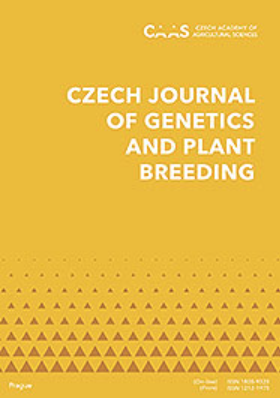茄子抗病性三个分子标记的筛选与鉴定
IF 1.8
4区 农林科学
Q3 AGRONOMY
引用次数: 0
摘要
尖孢镰刀菌。甜瓜(f.sp.melongenae,FOM)、大丽花黄萎菌(Verticillium dahliae,Ve)和青枯菌(Ralstonia solanacearum)是影响茄子栽培及其产量的主要限制性病原菌。自然抗性基因是控制该疾病最环保的方法。因此,标记辅助选择(MAS)是茄子抗性育种中筛选抗性基因(R基因)的首选工具。在这项研究中,与赋予F。在含有育种材料的群体中测试甜瓜、大丽花和青枯菌以验证抗性。利用番茄抗性材料LS1934和LS2436及其相互杂交作为本验证研究的抗性资源。此外,采用浸根接种法对FOM和Ve进行了经典抗性试验,根据其抗性/易感性反应对所有材料进行分类。SCAR426、CAPs_903和SIVR844标记对于抗性基因(Fomg、Ve和ERs1)的测定具有很高的信息量。因此,在对疾病高度敏感的地区,建议将相关R基因高效组合并将其聚合到商业茄子品种中,作为一种务实的方法。本文章由计算机程序翻译,如有差异,请以英文原文为准。
Screening and validation of three molecular markers for disease resistance in eggplant
Fusarium oxysporum Schlecht. f.sp. melongenae (FOM), Verticillium dahliae (Ve) and Ralstonia solanacearum are major limiting pathogens affecting eggplant cultivation and their yield in the world. Natural resistance genes are the most environmentally friendly method to control the disease. Thus, marker-assisted selection (MAS) is preferred as a tool for screening resistance genes (R-genes) in eggplant resistance breeding. In this study, markers that are specifically linked to major disease resistance genes conferring resistance to F. melongenae, V. dahliae and R. solanacearum were tested in a population containing breeding materials to validate the resistance. Resistant Solanum melongena accessions LS1934 and LS2436 and their reciprocal crosses were used as the resistance resource for this validation study. Moreover, classical resistance tests to FOM and Ve were performed with the root-dip inoculation method for classification of all the accessions based on their resistance/susceptibility responses. The SCAR426, CAPs_903 and SIVR844 markers were highly informative for the determination of resistance genes (Fomg, Ve and ERs1). Therefore, in areas with high susceptibility to diseases, a highly efficient combination of the relevant R-genes and their pyramiding into commercial eggplant varieties are proposed to be implemented as a pragmatic approach.
求助全文
通过发布文献求助,成功后即可免费获取论文全文。
去求助
来源期刊

Czech Journal of Genetics and Plant Breeding
Agricultural and Biological Sciences-Plant Science
CiteScore
2.20
自引率
0.00%
发文量
25
审稿时长
>12 weeks
期刊介绍:
Original scientific papers, critical reviews articles and short communications from the field of theoretical and applied plant genetics, plant biotechnology and plant breeding. Papers are published in English.
 求助内容:
求助内容: 应助结果提醒方式:
应助结果提醒方式:


